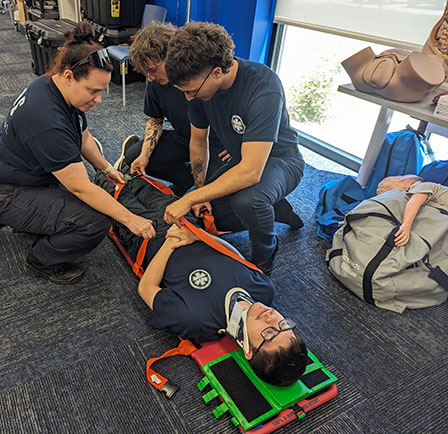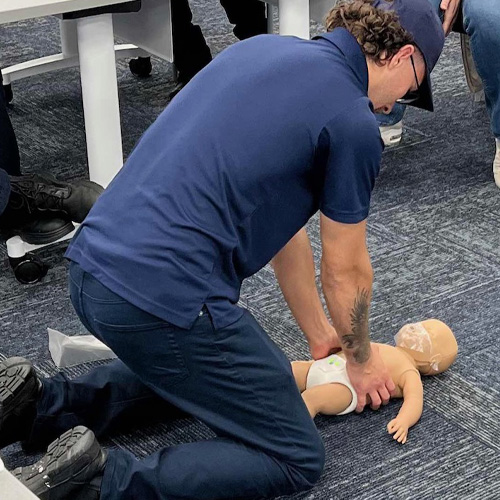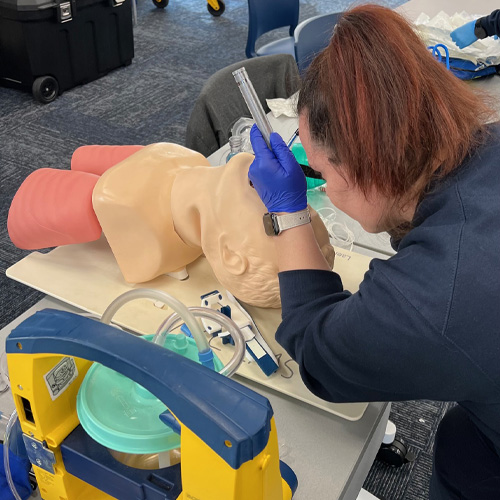The Emergency Medical Services education program is now located in the newly expanded Public Safety Institute at MCC-Blue River. Fall cohort classes will be Monday/Wednesday. Spring cohort classes will be Tuesday/Thursday.
Highlights
- The program provides coursework at both the Emergency Medical Technician (EMT) and Paramedic levels, featuring multiple start dates.
- The courses are structured to adequately prepare students for the National Registry of EMT's certification exams, and become competent, entry-level healthcare professionals.
- All programs are designed to exceed the current national EMS education standards.
- Students will benefit from extensive real-world clinical experiences, offering more hours than many competing programs, with placements available throughout the metropolitan area at local hospitals and ambulance services.
- MCC operates as a nonprofit institution, distinguishing it from many for-profit colleges.
- 100% placement rate after graduation
- See our frequently asked questions for more information.
Three options
Emergency Medical Technician
In one semester you will gain quick entry into the field of Emergency Medical Services. You can take classes during the day or evening and earn the eligibility to test for your license in one semester, including the summer semester.
You’ll be prepared to take the National Registry of Emergency Medical Technicians licensing exams.
Paramedic Certificate
If you're an EMT, the next step up the career ladder, higher salary, more responsibility and greater opportunity is to become a Paramedic.
Our four-semester program takes you through the required education and hands-on training and prepares you to apply for the National Registry of Emergency Medical Technicians examination process.
Paramedic Degree
Paramedics provide the highest level of care on an emergency scene.
Our two year program provides you with an associate degree and prepares you to apply for the National Registry of Emergency Medical Technicians examination process.
EMT classes
 EMT is not a program in and of itself but a part of the paramedic program. No application
is necessary and you can enroll online with your student ID number.
EMT is not a program in and of itself but a part of the paramedic program. No application
is necessary and you can enroll online with your student ID number.
The EMT class is called EMS 150 and is one semester long. We offer this class every semester: spring, summer and fall. The summer semester class is only eight weeks long and is very intense.
- Spring and fall semesters: MWTh 9 a.m. - noon, 6 p.m. - 9 p.m.
- NEW for Spring 2025: Wednesday 8am-4pm!
- Summer classes: MTWTh from 9 a.m.- 1 p.m. or 5:30 p.m. - 9:45 p.m.
Successful completion of this course will entitle you to take the national exams to obtain your EMTB license. EMS 150 is an eight-credit class that includes CPR certification as part of the coursework.
Accreditation
The Metropolitan Community College paramedic program is accredited by the Commission on Accreditation of Allied Health Education Programs upon the recommendation of the Committee on Accreditation of Educational Programs for the Emergency Medical Services Professions (CoAEMSP).
9355 - 113th St. N, #7709
Seminole, FL 33775
Phone: 727.210.2350
Fax: 727.210.2354
mail@caahep.org
8301 Lakeview Parkway
Suite 11-312
Rowlett, TX 75088
214.703.8445
FAX 214.703.8992
coaemsp.org
MCC's EMS education program has full accreditation status through 2/28/2029 awarded by the Missouri Department of Health Bureau of Emergency Medical Services, PO Box 570, Jefferson City, MO 65102, 573.751.6356. Training entity 09503.
Careers

Emergency Medical Technician
Annual Median Salary (2023) - $38,930*
The primary focus of the emergency medical technician is to provide basic emergency medical care and transportation for critical and emergent patients who access the emergency medical system.
This individual possesses the basic knowledge and skills necessary to provide patient care and transportation.
Emergency medical technicians function as part of a comprehensive EMS response under medical oversight. Emergency medical technicians perform interventions with the basic equipment typically found on an ambulance.
The emergency medical technician links the scene to the emergency health care system. (National EMS Education Standards)

Paramedic
Annual Median Salary (2023) - $53,280*
The paramedic is an allied health professional whose primary focus is to provide advanced emergency medical care for critical and emergent patients who access the emergency medical system.
This individual possesses the complex knowledge and skills necessary to provide patient care and transportation.
Paramedics function as part of a comprehensive EMS response under medical oversight. Paramedics perform interventions with the basic and advanced equipment typically found on an ambulance. The paramedic is a link from the scene into the health care system. (National EMS Education Standards)
Bright outlook for EMTs and Paramedics with a 5% to 8% projected growth from 2022
to 2032.*
*Visit Occupational Information Network (O*NET) to view salary information, employment outlook and personal characteristics needed for a paramedic or EMT career.
Program mission
To prepare competent entry-level paramedics in the cognitive (knowledge), psychomotor (skills) and affective (behavior) learning domains with or without exit points at the Advanced Emergency Medical Technician and/or Emergency Medical Technician, and/or Emergency Medical Responder levels.
-
Graduation Year Retention Rates Graduation Rates of Students Retained NREMT Written Exam 3rd Attempt Cumulative Employed in Healthcare Related Field Benchmark
70%Benchmark
70%Benchmark
70%Benchmark
70%2021 92.9% 100% 83.3% 100% 2022 83% 100% 88% 100% 2023 81% 94% 94% 100% -
View up-to-date tuition schedule and course fee information
Program Fees Total Cost* Textbooks (Used/New) $446.95/600.15 paramedic
$140 EMTFCSR $14 Document Management Process $140 Immunizations Costs will vary Total approximate cost* of the Paramedic EMS program:
Paramedic A.A.S. - $11,744
Paramedic Certificate - $9,149Total approximate cost* of the EMT basic course:
EMT-Basic - $2,230Approximate cost per semester for the paramedic EMS courses:
Semester 1 - $3,631
Semester 2 - $3,931
Semester 3 - $3,931*approximate cost does not include uniform and supplies and is based on in-district rates
Learn more about MCC's Payment Plan.